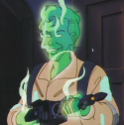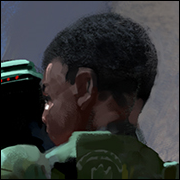|
Which Zizek quote best encapsulates it?
|
|
|
|

|
| # ? Jun 4, 2024 08:29 |
|
SuperMechagodzilla posted:Genisys is also a closed loop. It looks like you didn't understand either film. I don't think you understand closed loops. The only reason Kyle meets Sarah in T1 is because time is already broken. Nothing in the movie is about love, it's about inevitablity - Kyle will 'love' Sarah because he already/always did, because John sent him back in time because he already impregnated Sarah because...
|
|
|
|
Groovelord Neato posted:Which Zizek quote best encapsulates it? Let us take perhaps the most basic form of the time-travel scenario found in science-fiction stories, the so-called time-loop or time-paradox. It is a story in which the time-traveller journeys into the future, writes down the plans for a time-travel machine, and then sends them back to themselves in the past so that they can then build one to travel into the future. What is the real enigma here? it is not simply that the scientist or researcher is able to travel into either the future or past, After all, this is what is 'explained' by the existence of the time-machine. Rather, it is the possibility that the time-traveller, by the very act of deciding to travel to the past, subtly alters the complex chain of causes and effects that led them to doing so in the first place. As a result, nothing in the past ends up being able to explain the decision - we can never exactly repeat events the same way - and yet this only because the decision has already been made. And in a good time-travel narrative, this 'indecision' takes place at every moment. Every moment on the time-traveller's circuit absolutely must have happened the way it did for it to be completed and is entirely open, a moment when events might have turned out differently. Indeed, it is only because the decision has been made, because events do repeat themselves, because the circle is complete, that we are able to think that the decision might not have been made, that everything might have turned out differently, that the circle might have been broken. The decision is at once necessary (everything has already happened) and impossible (always deferred), one because of the other. All this is what is at stake in that 'arrest' of historical time we see in [Walter] Benjamin's 'messianism'. This 'arrest', this act of grasping the hidden revolutionary potential in a situation in a kind of stopping of time, holds, to put it in terms of language, the place of a certain excluded diachronic element that allows the formation of a synchronic system (and, as with ŽZižzek's discussion of this in For The Know Not, this fantasy of time-travel is fundamentally a fantasy of the primal scene, of seeing our own conception). That is, what we have in historicism, as in language, is a synchronic system, in which every part is dependent for its meaning on every other part: the past and the future are intertwined. This is the difficulty of thinking anything as the origin of such a system (for example, of capitalism), for as soon as we say what it is, we find that it is preceded by another, that it can only be understood in terms of the system itself. But precisely what Benjamin is trying to imagine is what is excluded to allow this. What does any historical explanation, which is ultimately only a fantasy of witnessing our own origins, stand in for? Is there not a kind of primal 'act' or 'trauma' that every named act takes the place of, which allows this 'fantasy' of entirely accounting for ourselves, of seeing ourselves from somewhere else? As ŽZižzek writes: "The very emergence of a synchronous symbolic order implies a gap, a discontinuity in the diachronic causal chain that led up to it, a 'missing link' in the chain. Fantasy [the fantasy, we might say, of time-travel or indeed of historical explanation] is an a contrario proof that the status of the subject is that of a 'missing link', of a void which, within the synchronous set, holds the place of its foreclosed diachronic genesis." It is in this sense that ŽZižzek speaks of what he calls, after Frederic Jameson, the 'vanishing mediator'. [...] The 'vanishing mediator' is not to be used to historicize an event, to provide a more detailed causal explanation for it, but - to paraphrase Benjamin - is a kind of 'arrest' or stopping-point that stands in for the excluded diachronic dimension of any historical explanation. That is, like the act itself, the vanishing mediator is not simply to be written back into the historical record, because it is also what must be left out for this record to be constituted. And if it testifies to a certain moment of 'undecidability' in the unfolding of events, a moment when things hung in the balance and could have turned out differently, it is an 'undecidability' that is only thinkable against the background of how events actually did turn out, an 'undecidability' that is not to be realized but haunts and makes possible every reality. It is an 'undecidability' - like Benjamin's 'revolutionary potential', like object a - that comes about only as its loss, that exists in the very from of its loss. [...] Far from vanishing, it is the one thing, in all its different guises, that always remains the same. It is what we eventually stumble over in any attempt to explain something historically, what resists when all else has been rationalized. To put it another way, in the time-travel story, everything is accounted for: the future explains the past as the past leads to the future. And yet there is one thing that cannot be accounted for - and that is the decision to travel back in time in the first place. And, again, if this decision is no sooner named than it is shown to be overdetermined, explained by a whole series of causes and effects, in another way this system is not possible until after this decision; this system is nothing but the infinite attempt to take the place of, explain, this decision. If this decision is infinitely predicted, must already have occurred for a symbolic order to exist at all, is is impossible to explain; it comes about only through an extraordinary act of will. For the true enigma of time-travel scenarios - from the Terminator series through to Groundhog Day - is why, if the future has already been determined, if future events must already have happened for the present to be the way it is, do we nevertheless have a sense that events could go astray at any moment, that things could turn out otherwise? At once - as revealed in Zeno's paradoxes and Benjamin's 'messianic' history - there is no difference between any two moments (the future is already in the past) and we can never get from one moment to the next (an infinite distance lies between them). At each moment ... the circle is closed, the decision has already been made, no act is necessary, and the future is uncertain, no decision has been made, only an act of supreme will can get us from one moment to the next. The circle is what does away with the will, what means that there is no need for a decision; and the circle is possible only because of a decision, is the one thing that demands that there must be a decision. And we see in all this ... that repetition and the act are not opposed, but that each implies the other, each is possible only because of the other. -Rex Butler, "Slavoj ŽZizžek: Live Theory" WarLocke posted:I don't think you understand closed loops. The only reason Kyle meets Sarah in T1 is because time is already broken. Nothing in the movie is about love, it's about inevitablity - Kyle will 'love' Sarah because he already/always did, because John sent him back in time because he already impregnated Sarah because... As explained in the above quote, the loop is a single loop that is nonetheless open to being modified. It is not just closed but overclosed. Characters know they're in a loop. "The question of freedom is, at its most radical, the question of how this closed circle of fate can be broken. The answer, of course, is that it can be broken not because ‘it is not truly closed’, because there are cracks in the texture, but, on the contrary, because it is overclosed, that is, because the subject’s very endeavor to break out of it is included in advance. That is to say: since our attempts to assert our freedom and escape fate are themselves instruments of fate, the only real way to escape fate is to renounce these attempts, to accept fate as inexorable. [...] accept fate as inevitable, and you will break its grasp on you." -Zizek
|
|
|
|
New Terminator openly endorses the idea, already implicitly there in the series, that time travel is a dice roll beyond any human understanding (Connor outright says this). That is to say, any talk of how Terminator's time travel science works is missing the point, because that isn't what's going on when you cause a paradox. Our new film is also clearly about family. Connor identifies that they can finally be a family unit, finally united in the same time--John, Kyle, Sarah, Pops, and even Skynet. All these things are now inextricably linked in a familial way, but their family feud has turned time into a broken home. New Terminator also explicitly rejects, as the others explicitly reject, that anything will always happen when you time travel. There are things that are likely, but that isn't certainty. In the new timeline, Skynet succeeded and John Connor does not exist. Skynet succeeded! John Connor was never born. Genisys smartly gets away from this canonized "certainty" that every movie has been quite clearly telling you is not actually there, so in addition to the themes going on, it's no longer a storyline completely devoid of suspense.
|
|
|
|
Panzeh posted:Yeah, I don't think a Future War movie could at all be really good- the Future War is a lot better when it's kind of a dreamlike nightmare- the shock is that John Connor actually won it. The movie doesn't really explain how, but it's not really necessary. Future War is great in little snippets and vignettes- it is not a good concept for a full blown movie. You can dig into some 80s dreck if you really want to see dudes with rayguns shooting robots shooting rayguns. Or watch Battle: Los Angeles.
|
|
|
|
Groovelord Neato posted:The Terminator series is two films Right, now let me argue that the Alien series only includes Alien and Prometheus simply due to Ridley Scott's participation in each.
|
|
|
|
Tenzarin posted:
Actually, I wish the movie was just non stop stuff I have never seen in a Terminator movie. That'd be awesome.
|
|
|
|
Immortan posted:Right, now let me argue that the Alien series only includes Alien and Prometheus simply due to Ridley Scott's participation in each. No it's just alien and Aliens smdh
|
|
|
|
SuperMechagodzilla posted:Since all previous Terminator films are about different modes of perceiving the present day, this film's innovation is the sheer number of modes. Ignoring the whole "Hey they didn't stick with the continuity of the same picture" thing being actually something, what is so special about that scene, to me, is Reese's statement asking "I always wondered what you were thinking about in that picture..." and it turns out she was thinking about him. That's amazing.
|
|
|
|
Groovelord Neato posted:Just slapping the name on don't make it a Terminator film Not to mention you're posting in the thread specifically dedicated to talking about the two movies you don't consider to be "true Terminator movies", whatever the hell that means.
|
|
|
|
You're about the last person to have this discussion with anyone.
|
|
|
|
Groovelord Neato posted:You're about the last person to have this discussion with anyone.
|
|
|
|
CelticPredator posted:Actually, I wish the movie was just non stop stuff I have never seen in a Terminator movie. That'd be awesome. In that case, I recommend the movie Mean Girls. It's a 2004 American teen comedy film directed by Mark Waters and written by Tina Fey. The film is based in part on Rosalind Wiseman's non-fiction book Queen Bees and Wannabes, which describes female high school social cliques and the damaging effects they can have on girls.
|
|
|
|
Xenomrph posted:Not to mention you're posting in the thread specifically dedicated to talking about the two movies you don't consider to be "true Terminator movies", whatever the hell that means. The new Terminator movies are not observed in the Old Testament.
|
|
|
OneThousandMonkeys posted:The new Terminator movies are not observed in the Old Testament. Neither were the old movies, Book of Revelation is New Testament. As an aside, I'd actually forgotten about the Mark of the Beast Reese showed off in Terminator 1.
|
|
|
|
|
SuperMechagodzilla posted:We're talking On Cinema At The Cinema here. Don't you DARE you son of a bitch!
|
|
|
|
Groovelord Neato posted:You're about the last person to have this discussion with anyone. Although you're not wrong, because I'd never play the "NOT MY TERMINATOR!!!" card to arbitrarily but sincerely decide that certain movies are Not To Be Discussed.
|
|
|
|
I actually thought this movie was trying to go in a new direction when Sky net was talking about how humans only destroy. But that was quickly dropped. John Connor was definitely more manipulative than previous terminators.
|
|
|
|
I like how skynet has a face, faceless person sending back countless assassins to murder people is very hard to visualize.
|
|
|
|
So did anyone else come away thinking that: 1. This may have been better being chopped up into a TV series, definately better than the SCC. 2. That Jai Courtney should really be playing T-800 in the future (I thought he did ok in Genisys). 3. That there's no reason why they can't bring back Robert Patrick as T-1000, or even just A T-1000, or a cop, or an FBI agent, or something. Furthermore, how did the T-1001 from the TV series differ from the T-1000 anyway?
|
|
|
|
Tenzarin posted:I like how skynet has a face, faceless person sending back countless assassins to murder people is very hard to visualize. That's why it was cool.
|
|
|
|
De Nomolos posted:3. That there's no reason why they can't bring back Robert Patrick as T-1000, or even just A T-1000, or a cop, or an FBI agent, or something. They should do that with Michael Biehn.
|
|
|
|
They should have straight had Michael Biehn be the T-1000 in this.blackguy32 posted:I actually thought this movie was trying to go in a new direction when Sky net was talking about how humans only destroy. But that was quickly dropped. John Connor was definitely more manipulative than previous terminators. Was this meant to just be a callback to the similar conversation Arnold has with Edward Furlong in T2? It seems like something that started that way and by the time the script was done they forgot they were homaging there or whatever.
|
|
|
|
Tenzarin posted:I like how skynet has a face, faceless person sending back countless assassins to murder people is very hard to visualize. It's Borg Syndrome all over again.
|
|
|
|
De Nomolos posted:Furthermore, how did the T-1001 from the TV series differ from the T-1000 anyway? It seemed pretty much the same, except: 1) Even smarter than the T-1000. It was so smart that Skynet lost control of it and it did its own thing. (Unlike the Arnold T-800s, no-one had to reprogram it first.) 2) Was able to separate a part of its body for a long time and that separated part was able to act independently. (The eel she had in a fishtank in her office was actually a part of her. Apparently in the DVD commentary they explain that the T-1001 made the separated eel part into a "key" for the time machine? So when she wanted to time travel to the future she recombined the eel back into her body. Not sure about this, I don't have the DVDs myself.) However, I suspect that actually there wasn't supposed to be any real difference... the only reason it wasn't called a T-1000 was due to some licensing/rights issue. (Same reason that the standard Terminators became T-888s rather than T-800s, and it was a T-850 in Terminator 3. The terms "T-800" and "endoskeleton" were separately copyrighted, so I assume they did the same thing with the term T-1000. )
|
|
|
|
'Endoskeleton' seems like an iffy term to copyright. How do you copyright the term for "an internal skeleton, such as the bony or cartilaginous skeleton of vertebrates." ? But yeah, the T-1001 is shown in TSCC as outright having its own plans, separate from Skynet's. In fact, some of the future sequences imply that either there is a group/network of them out there doing their thing, and/or the one in the present managed to travel back in time on its own (I forget the specifics but I do remember thinking that the one that got loose in the future sub was implied to be the one in the 'present' somehow) WarLocke fucked around with this message at 04:14 on Jul 6, 2015 |
|
|
|
De Nomolos posted:3. That there's no reason why they can't bring back Robert Patrick as T-1000, or even just A T-1000, or a cop, or an FBI agent, or something. Although IMDb says he does cameo in the movie, in the hospital. Xenomrph fucked around with this message at 04:33 on Jul 6, 2015 |
|
|
WarLocke posted:But yeah, the T-1001 is shown in TSCC as outright having its own plans, separate from Skynet's. In fact, some of the future sequences imply that either there is a group/network of them out there doing their thing, and/or the one in the present managed to travel back in time on its own (I forget the specifics but I do remember thinking that the one that got loose in the future sub was implied to be the one in the 'present' somehow) It was her or the T2 T-1000 because it exhibits some similar behaviors (wagging the finger, for example).
|
|
|
|
Tenzarin posted:I like how skynet has a face, faceless person sending back countless assassins to murder people is very hard to visualize. WarLocke posted:It's Borg Syndrome all over again. There's really only one way to go and that is to personalize The Adversary. It's not a Borg situation.
|
|
|
|
|
ruby idiot railed posted:There's really only one way to go and that is to personalize The Adversary. It's not a Borg situation. No there isn't, and yes, there is. There's a reason why people almost unanimously hate Skynet having a 'face' in Salvation. And that reason is that it undermines the threat of Skynet/terminators as they appeared in the first two movies ("You can't talk with it, you can't bargain with it, it will keep coming and never stop..." etc). It's Borg Syndrome all over again.
|
|
|
|
WarLocke posted:No there isn't, and yes, there is. I'm pretty ambivalent towards Skynet having a face. Like, yeah it's interesting if you've got a nonhuman intelligence that you can't really "see", because it makes you question how you can confront or overcome it. However, giving Skynet a face can be an interesting character point for Skynet, because it makes you wonder why Skynet would give itself a face? Is Skynet inherently "humanizing" itself? Does it loathe itself because of this, or is it a massive hypocrite? Is it a conscious choice to give itself a face, and if so what does that say about sentient creatures? Or maybe it's an inherent part of the programming that Skynet, even in its omnipotence, can't overcome? There's legitimately interesting ways you can take "Skynet with a face", but a lot of it hinges on characterizing Skynet in interesting ways, and Salvation didn't do that. It just gave Skynet a face and turned it into a moustache-twirling badguy for reasons. Faceless Skynet is easier to portray as some ominous Other. The moment you give your thinking, self-aware antagonist a face, you need to give it character or it ends up coming across as hokey (such as what happened in Salvation).
|
|
|
|
I'm watching T1 in HD on BBC America right now. It's censored pretty hard, so no boobies, and "F YOU" on the Terminators vision. What makes the movie great is all the emotion throughout the movie. Kyle is desperate from the get-go, Sarah is afraid and confused. The police are confident until all poo poo breaks loose at the police station. The sex scene is just as effective without boobies, because what it communicates is just how desperate and afraid Kyle and Sarah are, and how good it is for them just to get a tiny short break. Salvation and Genisys fail at this because there is nothing at stake throughout them, they are emotional flatlines. Also, the parts with the physical endoskeleton that are not stop motion look better than any CG skeleton that came later.
|
|
|
WarLocke posted:No there isn't, and yes, there is. That quote is in relation to how the Terminator is relentless, not that it does not have other qualities of intelligence. In T2, after the CPU's writeable memory was unlocked, the T-800 learned empathy and to reason. It was already clearly capable of making strategic decisions (we saw that in T1 when another Terminator lost track of Sarah Connor and so decided to go through Sarah's address book that it picked up from her apartment to track down her mother) but after its memory chip was unlocked, it was able to reason past a primary directive (follow John Connor's orders) in order to accomplish a larger mission, one that wasn't even originally programmed into it. It learned why and how humans experience emotions and how to express happiness, tiredness, sadness, and finally, approval. Without unlocking, we learned that the T-1000 acts very nearly out of some form of spite, and can clearly make joking gestures such as the finger wagging. You're confusing actual depicted attributes of Skynet and the Terminators with mechanical emotionless efficiency, something they've never been characterized as having or being. You can even assume from T1 that Skynet itself has the capacity for feelings--after becoming self-aware it immediately learned fear. Sending a Terminator back through time is a panic maneuver.
|
|
|
|
|
In fact, it's actually a pretty interesting word they used at the outset to describe Skynet. Self-aware. Hm.
|
|
|
|
|
evobatman posted:Also, the parts with the physical endoskeleton that are not stop motion look better than any CG skeleton that came later. Here's the teaser trailer for T2 that James Cameron directed, it's fantastic (and, incidentally, preserves the movie's "twist"): https://www.youtube.com/watch?v=TbcmLPXuQzo I love the practical/puppet work in 'The Terminator' (and T2), but I'll go ahead and say that the CGI endoskeleton at the end of Salvation was super cool. It looked like the filmmakers did the best they could to emulate the practical T1 endoskeleton's weight and movements and "presence" with CGI, and while it's not quite as good as the practical effect, it's still a worthwhile effort. https://www.youtube.com/watch?v=8r354VUktU8 Edit-- speaking of Skynet and fear, someone a couple pages ago mentioned a fan-fiction page written pre-T3 about the birth of Skynet and how Judgment Day went down in the Skynet control center. For those interested, you can read it here. Xenomrph fucked around with this message at 05:42 on Jul 6, 2015 |
|
|
|
I watched Terminator Salvation tonight. I think this movie gets a bad rap. It had some absurd special effects, but the plot was solid overall with only minor gripes here and there.
|
|
|
|
Skynet has always had a face, beginning in Terminator 1. Arnold is one of them. Then, the gleaming skull. In Terminator Salvation, Skynet actually looks like this, stretching out into infinity:  Contacting Skynet directly causes Marcus to black out, though, because it's just too much information. So, in the next scenes, Skynet slaps together an AI ambassador (with simulated voice and face) to 'speak for it'.
|
|
|
|
Xenomrph posted:It's entirely possible to have a faceless enemy and make it be compelling and interesting. "The Matrix" was a largely faceless entity throughout the trilogy, even if Agent Smith is an easier villain to fixate on. Sauron in the Lord of the Rings trilogy is absent for the bulk of the storyline, but he's still obviously considered a Big Deal. Skynet was the other go-to pop-culture example. Yes, thank you, that was my point. quote:I'm pretty ambivalent towards Skynet having a face. Like, yeah it's interesting if you've got a nonhuman intelligence that you can't really "see", because it makes you question how you can confront or overcome it. However, giving Skynet a face can be an interesting character point for Skynet, because it makes you wonder why Skynet would give itself a face? Is Skynet inherently "humanizing" itself? Does it loathe itself because of this, or is it a massive hypocrite? Is it a conscious choice to give itself a face, and if so what does that say about sentient creatures? Or maybe it's an inherent part of the programming that Skynet, even in its omnipotence, can't overcome? There's legitimately interesting ways you can take "Skynet with a face", but a lot of it hinges on characterizing Skynet in interesting ways, and Salvation didn't do that. It just gave Skynet a face and turned it into a moustache-twirling badguy for reasons. Faceless Skynet is easier to portray as some ominous Other. The moment you give your thinking, self-aware antagonist a face, you need to give it character or it ends up coming across as hokey (such as what happened in Salvation). Agreed, and to the bolded part I repeat, Borg Syndrome all over again.
|
|
|
Xenomrph posted:I'll come right out and say it, I love the T-800 endoskeleton design. It's straight-up perfect, and it's a testament to James Cameron and Stan Winston's design work that they achieved something that instantly looks equal parts menacing and functional the moment it's on-screen. The way all the pistons visually make sense for making the joints move, the attention to detail with little panels and port covers and stuff that appear to serve some function, even if that function isn't shown in the movie itself, the way it just outright looks heavy and formidable, it all goes such a huge way towards selling the illusion that it's a real, tangible, potentially-achievable robot and that holy poo poo you should be afraid of it. The T-800 is by far the best design. It's kind of sad that they made Arnold a T-1000 at the end of Genisys, really, because the half metal half flesh face is pretty much the defining memory people have of Terminator (or Linda Hamilton doing chin ups or the crazy nuclear skull winter future war).
|
|
|
|
|

|
| # ? Jun 4, 2024 08:29 |
|
WarLocke posted:Yes, thank you, that was my point.  I was just articulating that "Skynet with a face" isn't an insurmountably bad idea, just that it's easy to gently caress up (and Salvation did so). I was just articulating that "Skynet with a face" isn't an insurmountably bad idea, just that it's easy to gently caress up (and Salvation did so).
|
|
|











 I don't like the movie because the direction it ended up going wasn't thought about by ME!
I don't like the movie because the direction it ended up going wasn't thought about by ME! 

















